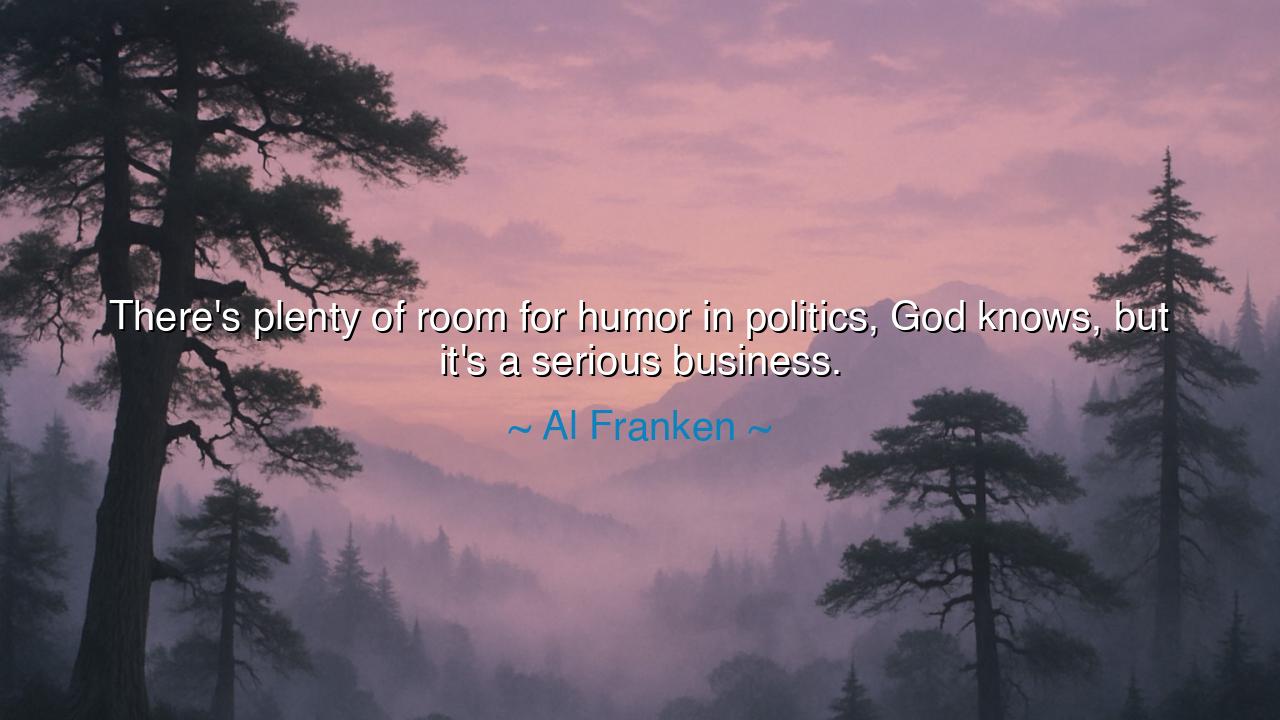
There's plenty of room for humor in politics, God knows, but it's






In the grand tapestry of human affairs, where power and influence shape the destinies of nations and peoples, there is a truth that cannot be denied: politics is a serious business. Yet, as the great Al Franken wisely observed, "There’s plenty of room for humor in politics, God knows, but it’s a serious business." These words carry a profound wisdom, for they remind us that while the world of governance, laws, and policies demands a certain weight of responsibility, it is precisely humor—that force of connection and insight—that allows us to navigate its complexities with both clarity and grace.
The ancients, too, understood that humor and seriousness are not mutually exclusive. The great philosopher Socrates, whose pursuit of wisdom often led him into the heart of political and social debates, frequently employed humor in his dialogues. Yet, his humor was never trivial; it was a tool used to provoke thought, to expose the contradictions in the beliefs of those around him, and to invite deeper reflection on the nature of virtue and justice. In the same spirit, Franken acknowledges that politics must be approached with seriousness, but humor serves as a vital tool to illuminate the absurdities and contradictions inherent in the system, making it more human and, ultimately, more accessible.
In the tumultuous political landscape of the Roman Empire, the famous orator and statesman Cicero often used humor to disarm his opponents and draw attention to the flaws in their arguments. Yet, even Cicero, who wielded humor like a sword, never allowed it to overshadow the seriousness of the task at hand. He understood that while humor could shed light on the corruption, injustice, and folly of the ruling class, the pursuit of justice and the well-being of the people required a steadfast and disciplined commitment. Franken’s words reflect this ancient understanding—humor, when wielded appropriately, can make the serious more palatable, but it should never undermine the gravitas of the work being done.
There are countless examples in history where humor has played a crucial role in political discourse, easing tensions and revealing uncomfortable truths. Consider the great Winston Churchill, whose speeches were often peppered with wit and dry humor, even as the world was embroiled in the grimmest of struggles. During World War II, Churchill used his humor not just to inspire and rally the British people but also to disarm the fear and despair that threatened to overwhelm them. His famous retort, “We shall never surrender,” was not just a statement of defiance but a declaration that even in the darkest times, humor and resilience would guide the nation. Like Churchill, Franken reminds us that while politics is a battlefield of ideas and power, it is through humor that we can endure and find hope.
The lesson of Franken’s quote is not just about the value of humor in politics but about the balance between light and darkness, between the gravity of responsibility and the freedom of expression. To take politics seriously does not mean to abandon joy or laughter; rather, it means to use humor wisely—to lift the spirits, to disarm hostility, and to reveal the hidden contradictions that lie at the heart of every political system. The ancients taught that laughter is a weapon of truth—a way to strip away pretense and expose the heart of the matter, whether it be in the context of governance, philosophy, or daily life.
In our own lives, let us take this wisdom to heart. Whether we engage in the political sphere or simply navigate the complexities of human relationships, we must remember that humor is not a distraction from the serious work we must do. Rather, it is a tool that enables us to approach life with both clarity and compassion, a way to cope with the overwhelming challenges we face and to connect with others. We must learn to balance the weight of our responsibilities with the lightness of laughter, for in doing so, we will find strength not only to face the world’s difficulties but also to inspire those around us.
Thus, let us approach our tasks—whether they be political, personal, or spiritual—with both diligence and humor. Let us never lose sight of the gravity of our work, but let us also remember the power of humor to make the journey more bearable, more human, and more meaningful. Like the ancients, like Franken, and like those who have shaped history with both seriousness and wit, let us strive to find the balance between the demands of the world and the joy that allows us to rise above them. In this balance, we will find the strength to confront any challenge, the wisdom to navigate any storm, and the lightness to keep moving forward.






AAdministratorAdministrator
Welcome, honored guests. Please leave a comment, we will respond soon